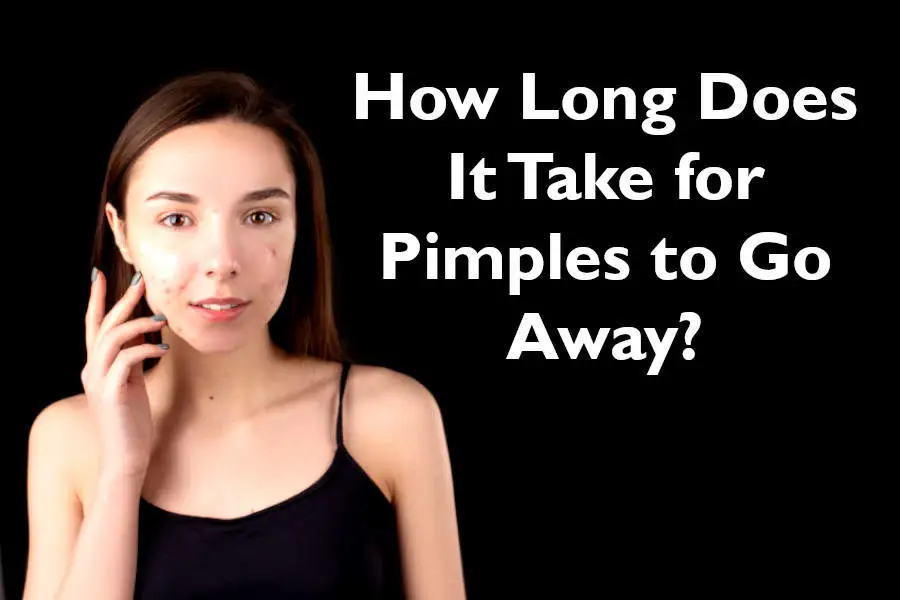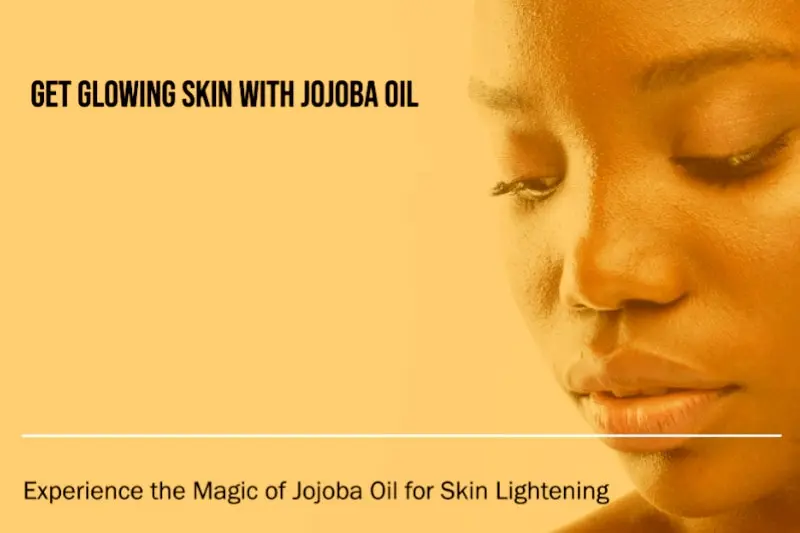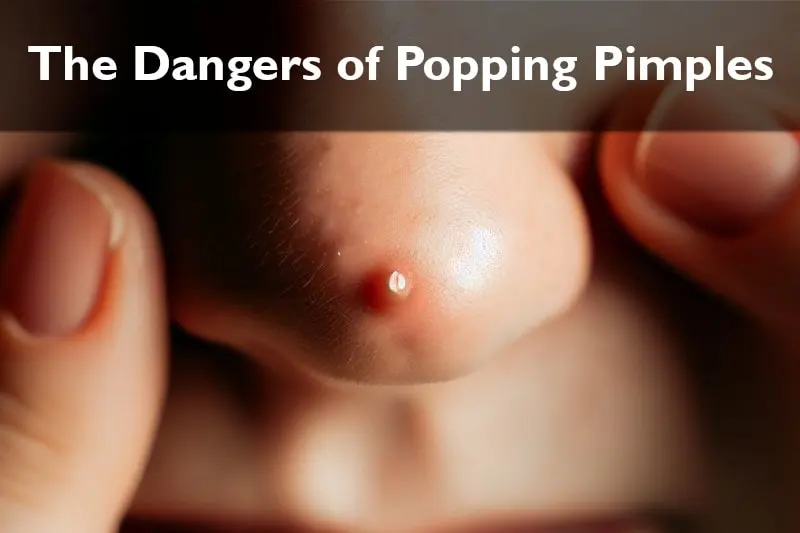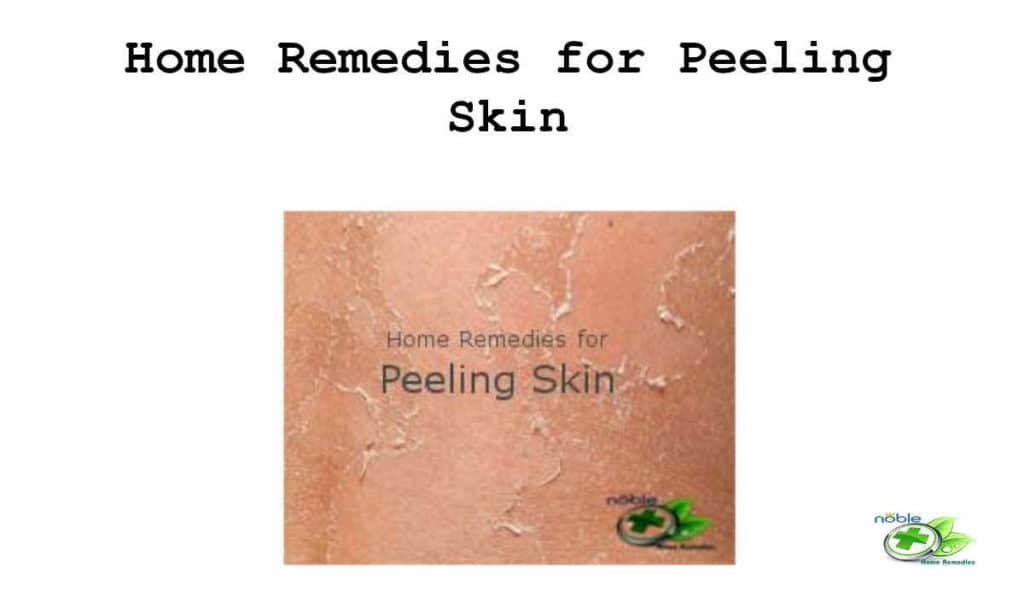Castor Oil: Your Secret to Lush, Beautiful & Powerful Eyelash Growth

It sounds like you’re curious about whether castor oil can be your secret weapon for getting those longer, fuller eyelashes you’ve been dreaming of! Many people are looking for natural ways to boost their lash look, especially after issues with things like eyelash extensions. It’s totally understandable to want beautiful lashes that make your eyes pop. Let’s dive into using castor oil for your lashes.
How to Use Castor Oil for Eyelash Growth: Your Guide to Healthier-Looking Lashes
Wanting longer, thicker, or fuller eyelashes is a common beauty goal. Maybe you’ve tried extensions and found they weren’t for you, or maybe you’re just looking for a gentle, natural way to care for your lashes. You might have heard whispers about castor oil as a potential helper for eyelash growth. It’s definitely a popular natural remedy that’s been used for ages. But how does it work? And how do you even use it? Let’s explore!
Castor oil is often talked about as a simple, affordable, and natural option for lash care. It offers a gentle approach compared to some chemical-laden serums you might find. People are turning to DIY remedies like this to potentially get fuller-looking lashes without some of the risks associated with prescription products or certain over-the-counter options. It’s like finding a natural helper in your own home!
In this guide, we’ll break down the topic of castor oil for eyelashes, including how to use it, what results you can expect, and what to watch out for.
Why the Buzz About Castor Oil for Lashes?
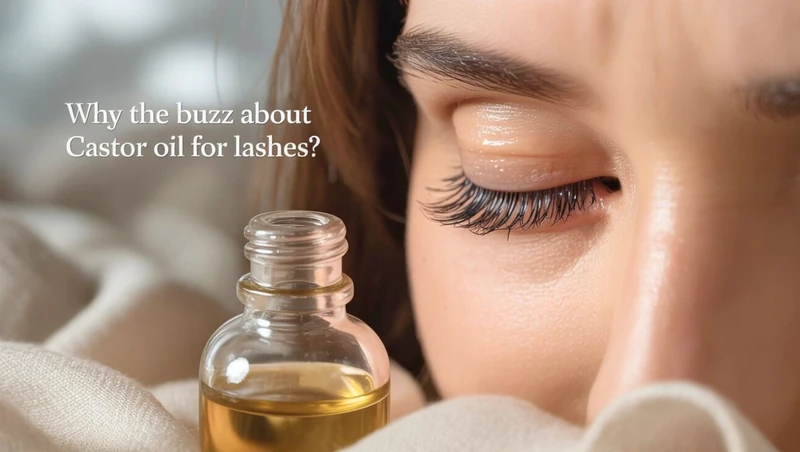
Castor oil comes from the seeds of the castor plant. It’s a thick, sticky oil that’s been used in lots of ways, from traditional medicine to beauty products. One of the big reasons it’s popular for hair, including lashes, is its unique makeup.
The Star Ingredient: Ricinoleic Acid
Castor oil is super rich in a special fatty acid called ricinoleic acid. This ingredient is thought to be the key player in why people use it for hair health and potential growth. The ricinoleic acid can nourish and strengthen hair follicles. Think of it like giving your lash roots some good food to help them be healthy and strong!
Beyond Growth: Conditioning and Strength
Even if it doesn’t magically make new lashes sprout overnight (more on that in a bit!), castor oil offers other benefits for your existing lashes. Its moisturizing properties can deeply hydrate your lashes, which can prevent them from becoming dry and brittle. Dry, brittle lashes are more likely to break off or shed too soon.
Regularly using castor oil can help condition and strengthen your lashes. This means they might be less likely to break or fall out. Several users say that they have noticed they were losing lashes way less after starting to use castor oil. One person felt it wasn’t about making eyelashes to grow faster, but that losing them less often meant the existing lashes could simply grow and be able to grow longer than before. Another user felt it made their eyelashes stronger and softer, even if it didn’t add length. It’s like applying a protective coat that keeps your lashes healthy and attached!
By keeping your lashes conditioned and preventing breakage and shedding, castor oil can help your lashes stay put longer, which might make them appear thicker and longer over time.
Does Castor Oil Really Make Lashes Grow Longer? What do we know!
This is the big question, right? You’ve likely heard exciting claims, but it’s important to look at what the sources tell us.
Some sources point out that there is currently no scientific evidence showing that castor oil directly accelerates new lash growth. This might not be what you hoped to hear. Scientific studies specifically focusing on castor oil causing eyelash growth are limited or scarce.
The Science Perspective
While direct lash growth studies are lacking, some research on hair in general offers clues. One study suggested that castor oil has properties that may help prevent hair loss. The theory is that the ricinoleic acid in castor oil might block certain substances (prostaglandins) that could inhibit hair growth or contribute to hair loss. Other research found higher levels of these prostaglandins in balding scalps. So, while it might not create new growth, it might help prevent existing lashes from falling out prematurely.
Another study from 2003 suggested that castor oil increased the “luster” of hair, which might also apply to eyelashes, making them appear shinier and potentially thicker.
Real-Life Experiences
Despite the lack of strong scientific studies proving growth, many users experience a difference. They have felt their lashes seemed longer and thicker after using it regularly.
One user swore they were starting to see a difference after just a week, and were pleased with the results on their lashes after three weeks. Another user saw results in about 2 weeks, while someone else took about 3 weeks. One user saw results in about 7 days, with very noticeable results in 2 months. Another person took 4 months or so to see results. A user trying it for just a week reported their lashes were blacker and longer. Some users were asked if they were wearing false eyelashes after using them.
As discussed before, this perceived “growth” could be because the oil is conditioning the lashes, making them look healthier, shinier, and potentially appear thicker. It might also be because by preventing breakage and shedding, the lashes are simply able to stay in place longer and reach their natural maximum length. As one puts it, castor oil mainly works by strengthening your lashes to prevent them from falling, not necessarily by increasing the work of the hair root. You have to wait for your hair to grow naturally, so the time it takes to see length depends on your own hair growth cycle. This is why patience and consistency are important.
So, while science is still catching up to user reports, the anecdotal evidence suggests that castor oil can definitely improve the appearance and health of your eyelashes, which can lead to them looking longer, thicker, or fuller. It’s not a magic beanstalk for lashes, but it might be a great conditioner and protector!
How to Use Castor Oil on Your Lashes, Step-by-Step
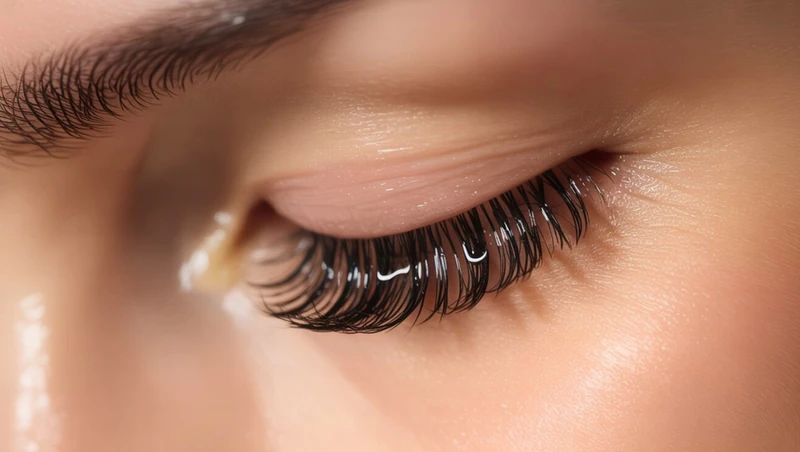
Ready to give it a try? Using castor oil on your lashes is pretty simple. Here’s a common way to do:
Gather Your Tools
You’ll need some pure castor oil and a way to apply it carefully to your lash line. Some users mentioned using a clean cotton swab (Q-tip), a clean mascara spoolie or brush, or even an eyeliner brush. You could even use your finger, as one user did. Having dedicated tools like empty spoolie tubes and brushes can be helpful.
Prep Work
Start with a clean face and clean lashes. Make sure all makeup and dirt are removed. This is super important for eye health! One user always removed makeup before bed.
Before you apply it near your eyes, it’s a really good idea to do a patch test first. Put a tiny bit of castor oil on a small area of skin away from your eye, like your inner arm or elbow, the day before you plan to use it. If you don’t have any reaction (like a rash or itchiness) after 48 hours, you should be good to go, though it’s still wise to be cautious.
Application Time
Generally, it is recommended to apply castor oil right before going to sleep. This gives the oil uninterrupted time to work. However, some do see good results when applied during the afternoon instead of at night.
Here’s how to apply:
- Dip your clean applicator (spoolie, Q-tip, or brush) into a small amount of castor oil. A little goes a long way, as the oil is thick. Using too much can lead to issues.
- Gently run the applicator along your upper lash line, right at the roots of your lashes. One method involves applying a thin layer on the roots following the lashline and then on the whole length using a mascara spoolie.
Caution: Be extremely careful to avoid getting the oil in your eyes. Your eyes are sensitive. If you do get oil in your eyes, wash it out right away.
Let it Work
Leave the oil on overnight to give it plenty of time to soak in and nourish your lashes.
Morning Routine
In the morning, gently wash your face and lashes to remove the oil. You can use warm water and a clean towel, or a mild soap or makeup remover. Make sure to thoroughly cleanse before applying makeup.
Tips for the Best Castor Oil Experience
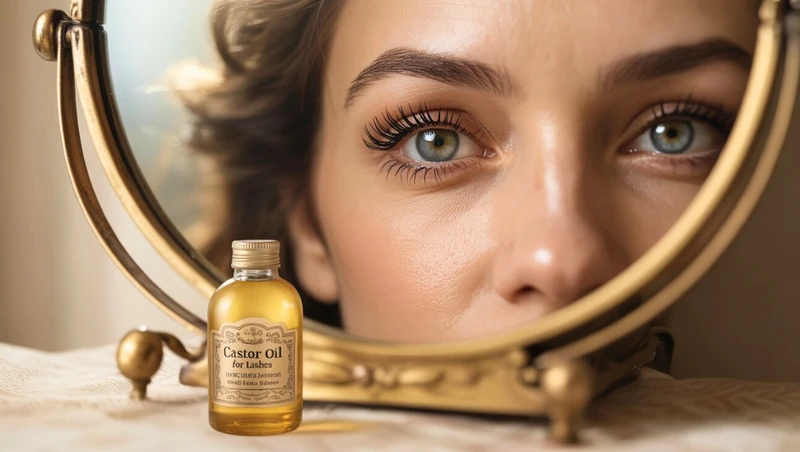
To get the most out of using castor oil and reduce the chance of issues, here are some tips:
Choosing the Right Oil
Using organic, cold-pressed castor oil is recommended for potentially better results and purity. Cold-pressed oil doesn’t use heat in processing and is pale yellow. Jamaican black castor oil, another type, is darker because the seeds are roasted first. While Jamaican black castor oil is common for hair, there’s little research proving it’s better specifically for lashes, and anecdotal usage includes both types.
High-quality, pure castor oil is generally recommended for use on the body. An optometrist recommends organic, unrefined, hexane-free, and cold-pressed castor oil for eyelash growth.
Consistency is Key
Seeing results takes time and patience. Applying consistently is the key. The best is every night. A few times a week is also good enough. Regular use is crucial for potentially seeing improvement.
Less is More
Castor oil is thick and heavy. Using just a single drop is often enough for the lashes. Applying too much can lead to irritation or the oil getting into your eyes, causing a heavy, goopy, or clouded feeling. Use only the “bare minimum necessary” or a “minuscule amount”.
Watch Out for Your Eyes
Again, it’s worth repeating: be very careful to keep the oil out of your eyes. Use a light touch and apply gently. If you get it in your eyes, wash it out immediately. The direct contact can cause irritation and discomfort.
Potential Bumps in the Road: Side Effects and Risks
While castor oil is generally considered safe for topical use and is even in many cosmetic products, using it near your sensitive eye area isn’t risk-free. It’s important to be aware of the potential issues:
Irritation and Goopiness
Castor oil can sometimes make eyes feel heavy, goopy, clouded, or sticky. This might happen occasionally or frequently. Getting the oil inside the eyes can be irritating.
Styes or Bumps
Some may experience recurring styes or bumps on their eyelids when using castor oil. Yet, this could be a personal issue for people prone to styes or with sensitive eyes. While castor oil is generally known to be non-comedogenic (meaning it shouldn’t clog pores), some individuals might still react this way. One user kept getting a stye when using it, suggesting it’s not for everyone.
Allergic Reactions
Like any product, some people can be allergic to castor oil. An allergic reaction might look like skin irritation, a rash, or itchiness. This is why the patch test is so important. If you notice irritation, you should wash the oil off and stop using it.
Important Note: Consult a Doctor
If you have existing eye conditions (like conjunctivitis or uveitis) or if you experience any irritation, pain, or unusual symptoms after using castor oil, it’s crucial to wash it off, stop using it, and see a doctor or ophthalmologist. The American Academy of Ophthalmology recommends using sterile products for the eyes and always following medical advice when using products near them. An optometrist also suggested that those with any eye health concerns chat with a doctor before trying any cosmetic eye remedies.
Comparing Castor Oil to Other Options
Castor oil isn’t the only thing people use for lash enhancement. There are a few other options, each with its own pros and cons:
Prescription Serums (Like Latisse)
Latisse is a well-known prescription medicine that is FDA-approved specifically for enhancing eyelash growth. It contains an ingredient called bimatoprost, which has been scientifically proven to make lashes grow longer, thicker, and darker.
However, prescription serums like Latisse come with potential side effects. These can include eyelid hyperpigmentation (darkening of the skin), red eyes, and dry or itchy eyes. These side effects usually go away if you stop using the product.
More seriously, Latisse can potentially cause a permanent darkening of the iris (your eye color). Some users mentioned experiencing orbital fat loss around the eyelid with similar products like Nulash and Grandelash, attributing this symptom to them. Latisse is generally safe when applied correctly, but people with certain eye conditions should not use it. You need a prescription to get it.
Over-the-Counter Serums
Many lash serums you can buy without a prescription contain ingredients similar to those in Latisse, often synthetic versions of prostaglandins. These are sometimes named differently, like isopropyl cloprostenate. While they work similarly to Latisse, they may have more variable results and potency because over-the-counter products aren’t regulated by the FDA as strictly as prescription drugs. This means they might also carry similar risks, such as irritation, skin darkening, or potential fat loss around the eyes for some people.
Other Natural Oils
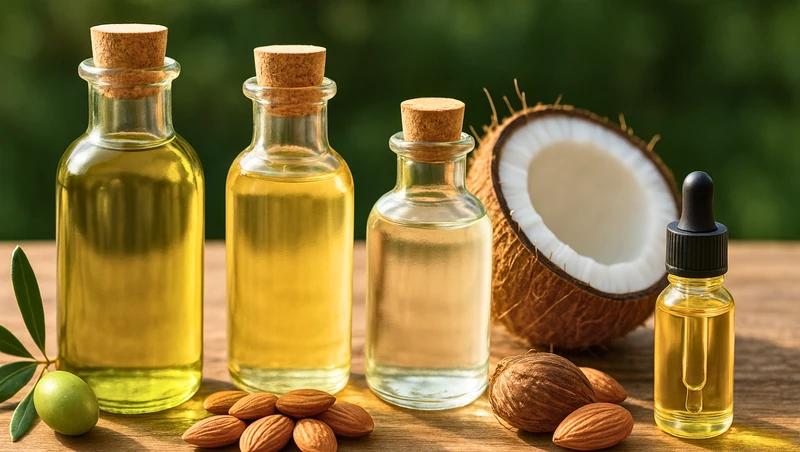
People also use other natural oils for lash care, including olive oil, almond oil, coconut oil, and vitamin E oil. However, here too, the science backing the growth claims for these oils is also limited.
- Olive oil is mentioned by one user who felt it worked for them. They felt it suited their dry skin and used it for various purposes.
- Almond oil is mentioned as a lighter oil that can feel goopy around the eye, similar to castor oil. Some claim it helps moisturize follicles and prevent shedding, but research is limited.
- Coconut oil is also a popular natural alternative. While there’s not much science proving it stimulates growth, one older study suggested it helps prevent protein loss in hair, which could help keep lashes healthy and looking better.
- Vitamin E oil is another popular ingredient, sometimes mixed with castor oil. However, vitamin E oil alone doesn’t really induce hair growth. It might help with hair growth in certain cases by reducing stress on the scalp, but this is different from stimulating follicles, and too much vitamin E could even negatively affect hair growth. Castor oil is naturally rich in vitamin E, which might be where some of the confusion comes from.
Other DIYs
Other DIY methods mentioned include petroleum jelly (like Vaseline) and aloe vera. However, none of these have been proven effective by science to grow lashes, though they might make them look a bit more dense. Biotin supplements are another option, but you should ask your doctor before taking any new supplements.
Comparing these options, castor oil is a natural, affordable choice with strong anecdotal support for conditioning and strengthening, potentially leading to the appearance of longer, thicker lashes by preventing loss. Prescription serums have scientific proof of growth but higher risks. Over-the-counter serums fall somewhere in between, with similar potential risks to prescriptions but less regulation. Other natural oils are used, but evidence for growth is also limited, though they may offer conditioning benefits.
Timeline for Results: Patience is a Virtue
If you decide to try castor oil, you’re probably wondering how long it takes to see a difference. Based on user experiences, it really varies from person to person:
- Some users saw changes relatively quickly, reporting seeing a difference after a week, about 2 weeks, or about 3 weeks.
- Others took longer, noticing results after a few weeks or even 4 months or so.
- One user saw very noticeable results after 2 months.
- One user reported seeing results after just one week, with lashes looking blacker and longer.
So, there’s no single answer! It seems that some people might notice subtle changes in lash health or appearance within a couple of weeks, while for more noticeable length or thickness, it could take a month or longer.
Remember, if castor oil mainly works by strengthening lashes and preventing them from falling out, you’re waiting for your existing lashes to naturally grow out to their full potential length. The hair growth cycle takes time. This natural growth rate is different for everyone. So, patience and consistency are key. Don’t get discouraged if you don’t see dramatic changes right away!
Beyond Castor Oil: Overall Lash Care
While you’re focusing on castor oil, remember that overall lash health matters too. Here are a few other things that can help your lashes look their best:
- Gentle Makeup Removal: Taking off your mascara and eye makeup carefully helps prevent damage and breakage. Make sure to remove all makeup before bed.
- Diet and Health: A Diet with more protein and a good skincare routine. Your overall health and nutrition can play a role in hair growth and health.
- Understanding Lash Shedding: It’s totally normal for eyelashes to fall out!. Lashes have a natural growth cycle, and shedding happens at the end of that cycle to make room for new lashes. Losing a few here and there is expected. If you’re experiencing significant lash loss, it might be due to an underlying condition, diet, medication side effects, allergies, or even your makeup. In that case, addressing the root cause is important.
Taking good care of your lashes generally, alongside trying remedies like castor oil, can contribute to healthier-looking results.
Takeaway
So, does castor oil grow eyelashes? There isn’t strong scientific evidence proving it makes them grow faster or create new hair.
However, there’s a lot of anecdotal evidence from many who feel it has made a real difference in the appearance of their lashes. The castor oil characteristics of moisturizing, conditioning, and strengthening properties can help prevent lashes from breaking and shedding prematurely. By keeping your lashes healthier and allowing them to stay in place longer, they can reach their full natural length and potentially look thicker and fuller than before.
Using castor oil is a simple, natural, and affordable way to potentially boost your lash health. If you decide to try it, remember to use a small amount, apply it carefully to your lash line (usually at night) with a clean applicator, be consistent, and be patient.
Most importantly, be mindful of your eyes. Do a patch test first. Watch out for potential side effects like irritation, goopiness, or styes. If you have sensitive eyes, existing eye conditions, or experience any problems, stop using it and consult a doctor.
Ultimately, finding what works for your lashes can take a little time and experimentation. Whether it’s castor oil or another approach, prioritizing gentle care and paying attention to how your eyes react is key to achieving those lush, beautiful lashes safely. Good luck on your lash journey!
Sources:
- Castor Oil for Eyelashes – Your Secret to Lush, Beautiful Lashes
https://aromahpure.com/blogs/news/castor-oil-for-eyelashes-your-secret-to-lush-beautiful-lashes - Castor Oil for Longer Lashes: Does It Really Work?
https://greatist.com/health/castor-oil-for-eyelashes - What to know about castor oil for eyelashes
https://www.medicalnewstoday.com/articles/325541 - DIY Eyelash Growth Serum: What Might Work for Lush Lashes
https://greatist.com/live/eyelash-growth-at-home-tricks - Does Castor Oil Grow Lashes?
https://jill.health/does-castor-oil-grow-lashes/ - How to Use Castor Oil for Eyelashes, From an Optometrist
https://www.mindbodygreen.com/articles/how-to-use-castor-oil-for-eyelashes-from-optometrist - I applied castor oil on my lashes for a month, and here’s what happened
https://www.healthshots.com/beauty/natural-cures/i-applied-castor-oil-on-my-lashes-for-a-month-and-heres-what-happened/
Trust in your purchase:
Every product featured on our site has been carefully researched and selected based on quality, customer ratings, and positive reviews to ensure you receive excellent value for your money.
Please note:
This post contains affiliate links. If you make a purchase through these links, we may earn a small commission at no additional cost to you. This helps support our site and allows us to continue bringing you valuable content. Thank you!
Thank you for your precious time spent with NobleHomeRemedies.
You may also like:
How Long Does It Take for Pimples to Go Away
How Long Does It Take for Pimples to Go Away: Ultimate Guide Pimples, oh pimples!…
Does Coconut Oil Whiten Skin?
Does Coconut Oil Whiten Skin? : Unlock the Secret! Hey there! Have you ever wondered…
Jamaican Black Castor Oil for Hair Growth
Jamaican Black Castor Oil for Hair Growth: + 4 Top Recipes Wish your hair would…
Jojoba Oil for Skin Lightening
Jojoba Oil for Skin Lightening: Best 7 DIY Recipes Have you ever wished for a…
Why Popping Pimples Is Harmful
Why Popping Is Harmful?: 6 Scary Dangers of Popping Pimples We’ve all been there, that…
How to Get Rid of Peeling Skin Naturally?
Peeling Skin: 9 Natural Ways to Get Rid of Peeling Skin Fast Home remedies for…

